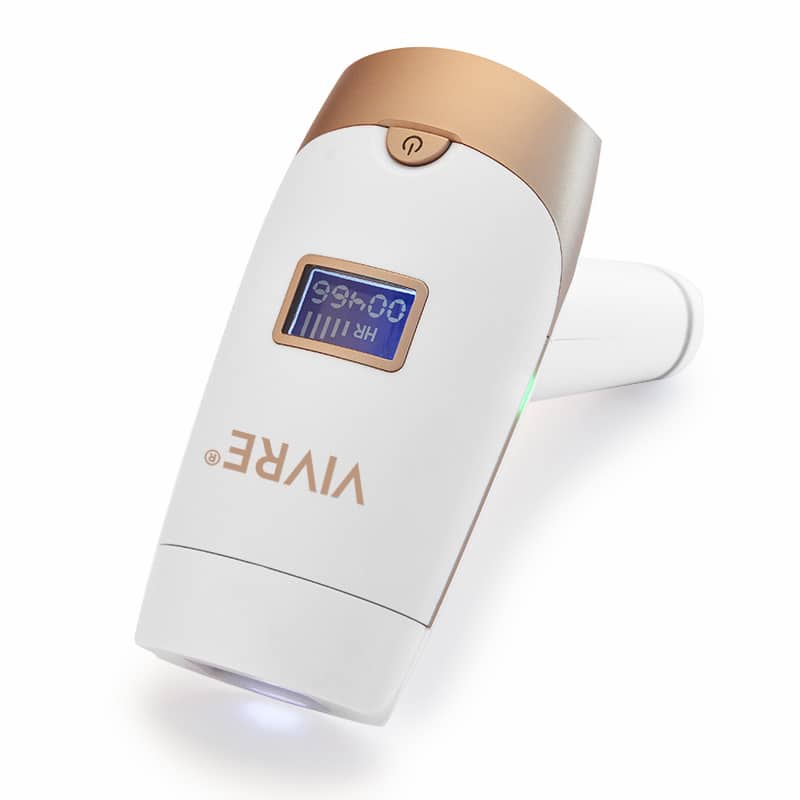Hair Removal
9 ways for facial hair removal that really work
Table of contents
Hair Removal in face - Even coarse, dark facial hair has no chance.
All women have facial hair, even super cool celebrities. We're hairy people and it's nothing to be ashamed of – despite what the super-magnifying mirrors would have us believe. That said, if you're not a fan of facial hair, don't feel like you have to sit back and do nothing about it. In fact, there are actually tons of ways to remove hair from the face on. Just keep in mind that if you're concerned about excessive facial hair, it's best to seek medical attention in case it could be a sign of another underlying condition.
To learn all about the do's and don'ts of removal hair in this ultra-sensitive zone, we enlisted the help of some experts, and they did not disappoint. Using their insider insights, they tipped us off on do-it-yourself tips, all-natural techniques, and in-clinic options to get the best methods for hair removal in the face in both the short and long term.
Hair removal on the face by different methods
Of all the beauty treatments out there, hair removal in the face är en av de minst trevliga aktiviteterna. ”Nästan alla har lite ansiktshår,” förklarar April Franzino, GH:s skönhetschef. ”Det tenderar att vara ljusare och mindre grovt än annat kroppshår.”
But hair removal on your lip, brow or chin doesn't have to be difficult or super painful. Facial skin is sensitive (and often the first thing people see!), so you want to be extra careful in choosing the best hair removal method that works on face for you.
We spoke to top experts in the field, from dermatologists to estheticians to get the lowdown on how to do it shave to the best epilators and IPL the laser for your face.
So whether you want to get rid of that fuzz along your upper lip, hairs on your chin or between your brows, here's what you need to know about every possible way, plus the best hair removal products for your face.
Facial Hair Removal by tweezers
- Best for: Small areas (like hairs on the chin), "stringy" hairs or for shaping brows.
- Pain level: Low to medium
- DIY-safe: Yes
The chance is great to pick hair with tweezers is the method with which you are most familiar. After all is hair removal face with tweezers is the most common method in most households because it is the easiest thing to do when you see some hairs on your face.
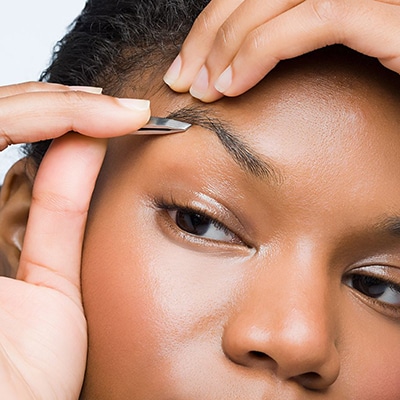

”Användning av pincett är bättre för mindre, lokaliserade områden som ögonbrynen och hakan”, råder Lavanya Krishnan, som är hudläkare. Se bara till att du är flitig med att rengöra dem.
Birnur Aral, director of Beauty Lab, recommends wiping the tweezers before and after each use with a cotton pad moistened with ethyl alcohol or alcohol and letting them dry.
Do not wash the tool with ordinary soap and water - you risk accidentally dropping and damaging it (thanks to slippery hands) or possibly damaging or oxidising the metal.
And you should always keep tweezers in a protective bag. "Manufacturers often offer a guarantee for natural wear and tear, but dropping tweezers will probably destroy the tips and then the guarantee won't apply," adds Aral.
Facial Hair Removal by Waxing
- Best for: Coarse, thick hair and on larger areas, for skin that is not easily irritated.
- Pain level: High
- DIY-safe: Sometimes
Another very common method is waxing. Using either soft wax, which is pulled off with strips of fabric, or hard wax, which is melted down, hair can be removed from the upper lip, cheeks, eyes and chin with relative ease. But this popular method is not for everyone.
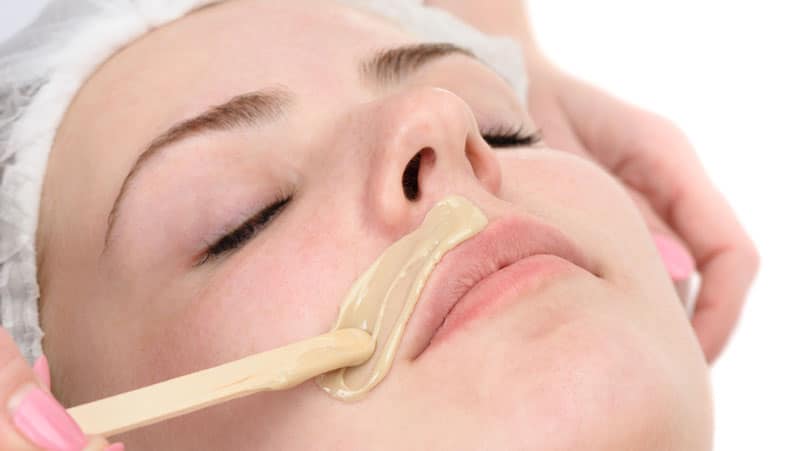

”Vaxning kan orsaka irritation eftersom huden kan vara känslig för de produkter som appliceras på den” varnar Michelle Yagoda, kosmetisk kirurg.
”En inexakt teknik kan leda till ofullständig extraktion av hårsäcken och hårbrottets brytning, så att huden som omger håraxeln kan bli inflammerad.”
If the retained hair follicle gets stuck, it can lead to ingrown hairs. Always read online reviews before buying new wax. Your skin will thank you.
With practice and a gentle hand, you can also wax at home.
Facial Hair Removal by shaving
- Best for: Fine hair all over the face and skin that is not sensitive to razors
- Pain level: low
- DIY-safe: Yes
More and more women are choosing to shave their faces either at a salon in a process called "dermaplaning" or at home themselves.
Rakning är ett smärtfritt sätt att ta bort hår från ansiktet, ”och det är bara en myt att ditt hår kommer att bli grovare och tätare efter rakning”, förklarar hudläkaren Krishnan. ”Follikeln klipps i hälften så den känns starkare, men den är inte tjockare.” Säger Krishnan.
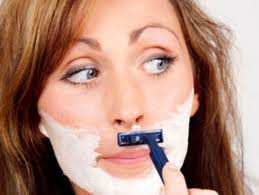

Om du känner dig mest bekväm med en rakblad, var noga med att vidta försiktighetsåtgärder så att du får den smidigaste, minst irriterade hudytan. ”Raka antingen i the shower or shortly afterwards to allow the skin to soften,” advises Anthony Sosnick, shaving expert and founder of Shaveworks.
Another advantage of shaving in the shower is that if you have thick or coarse hair, the steam warms and softens the hairs. You can also apply a pre-shave oil to avoid razor burn.
Ett bra rakblad är också viktigt. Om du väljer en traditionell rakkniv, rekommenderar Sosnick att välja ett med minst två blad, eftersom ”de tenderar att vara mer riktade för de känsliga områdena”
A tip from dermatologist Michael Swann: don't shave the same area repeatedly with your razor. Otherwise you risk irritating your skin. Once you've finished shaving, apply a moisturiser to soothe your skin.
Facial hair removal by threading
- Best for: Smaller areas such as the eyebrows, upper lip and cheeks
- Pain level: Medium-high
- DIY-safe: No
Eyebrow threading is a very common practice in Middle Eastern and Asian countries that involves using a thin, doubled cotton thread to roll over patches where you want to remove hairs and thus pull them out.
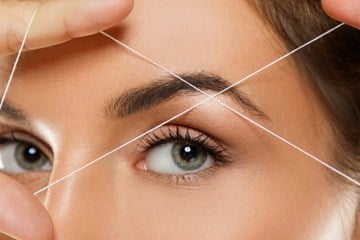

Although not as laborious as plucking one hair at a time, it works best on smaller areas such as the eyebrows, upper lip and cheeks.
Unlike using tweezers, threading is much harder to try if you've never been trained in it, so go to a salon with a professional who specialises in threading for the best results.
Facial Hair Removal by hair removal cream
- Best for: Large hair areas, such as legs and arms
- Pain level: Low-medium
- DIY-safe: Yes
Gone are the days when facial hair removal creams were harshly scented - there are plenty of new creams these days that are gentle and fragrance-free. These creams are applied to the area of unwanted hair and then wiped away along with the hair itself.
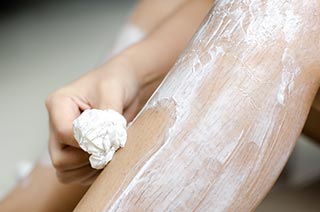

”Hårborttagningskrämer använder kemikalier som kalciumtioglykolat eller kaliumtioglykolat, som bryter disulfidbindningar i keratin och därmed försvagar håret” förklarar Christine Choi Kim, hudläkare.
This is one of the most painless forms of facial hair removal and even other parts of the body, with the exception of some mild tingling or redness when the hair melts away.
If you have very sensitive skin you may experience irritation, always do a patch test first to check for allergies.
Facial hair removal by epilation
- Best for: Remove hair at the root from larger areas (such as forearms, arms and cheeks)
- Pain level: Medium-high
- DIY-safe: Yes
Till skillnad från pincett som drar ut enskilda trådar, plockar epilatorn ut flera hårstrån på en gång, utmärkt för att snagga kvarvarande hårstrån mellan vaxningar. ”Tänk på enheten som flera små pincetter, alla går på en gång”, förklarar Aral.
Det är närmast strecket på smärtskalan, så smärtsammare än plockning, men inte så illa som vaxning. Dessutom, ju mer du använder den, desto mer vana kommer du att känna och du kanske inte ens anser det som smärtsamt efter regelbunden användning. ”Försök inte använda en epilator to shape the eyebrows", warns Aral.
”Mellan dina bryn är okej, men var försiktig med områden som behöver en mer exakt plockning”. Hon rekommenderar detta för hårborttagning i ansiktet, på hakan och till och med underarmarna.
Hair removal through the use of prescription medication
- Best for: Slow down hair growth temporarily
- Pain level: Low
- DIY-safe: Yes
In addition to the above methods, you can also talk to your dermatologist about trying medications that slow down hair growth.
”Det finns receptbelagda läkemedel som Vaniqa, which is a topical once-a-day treatment used to reduce hair growth," explains Dr. Krishnan.
Även om det är ”mycket effektivt” så kommer håret att växa tillbaka när du slutar med Vaniqa konstaterar Dr. Krishnan.
Facial hair removal by laser hair removal in clinic
- Best for: Permanent hair removal for coarse hair or larger hair growth areas (legs, arms, etc.)
- Pain level: High
- DIY-safe: Between
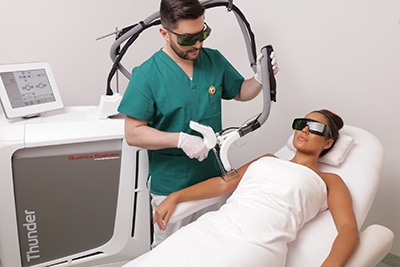

For permanent hair removal you can test laser hair removal, även känd som intensiv pulsljusterapi. ”Lasrar skjuter en viss våglängd av ljus som specifikt absorberas av hårsäcken själv”, säger Dr. Krishnan. När det ljuset absorberas omvandlas det till värme som dödar hårsäcken.
The advantage of this approach over electrolysis is that it treats a larger portion at a time, whereas electrolysis (explained below) individually removes one follicle at a time - think waxing versus plucking.
Cons: This is not an ideal route for those with light or fine hairs, and the cost is high, from 500 SEK to 3000 SEK per session. In addition, you may need several sessions to completely destroy the follicles.
Facial hair removal by IPL at home
- Best for: Permanent hair removal for coarse hair or larger hair growth areas (legs, arms, etc.)
- Pain level: low
- DIY-safe: Yes
Hair removal at home with IPL or in a salon? Doing it yourself at home saves time, but you need to do it more regularly to begin with and it's safer with today's IPL devices.
Having hair removal treatment in a salon requires the knowledge of a professional and can lead to faster results. In both cases, the results will be similar - a significant reduction in body hair.
IPLtechnology – also known as intense pulsed light technology – is actually not one laser treatment, Xu clarifies. "Unlike laser hair removal it uses a wide spectrum of light with multiple wavelengths. This means it has more unfocused energy around the hair and skin area. ” So IPL uses multi-spectrum light whereas laser uses single-spectrum light, meaning IPL energy is spread out and much weaker. Laser has a condensed light, and all energy is focused on this single light. "
This makes IPL a gentle and effective treatment. When IPL is used for hair removal, it usually requires six to eight treatments to see a complete removal of hair in one area. However, this is dependent on the person's skin tone, hair colour and also the thickness of the hair.
Facial hair removal by dermaplaning
Believe it or not, dermaplaning is actually a version of facial shaving that involves removing the top layer of skin (and the hair along with it) using a small exfoliating scalpel. The results last for about two weeks, and while you may think your hair is growing back thicker than before, it's not. Try using a moisturising serum after shaving for an extra dose of moisture that penetrates the fresh, smooth skin.
Those we have spoken to recommend DermaFlash, which is inspired by dermaplaning. It is many people's favorite tool to even out the skin and create a clear and glowing complexion. Afterwards, you can apply a growth factor-serum to soothe the skin and create lasting results.


